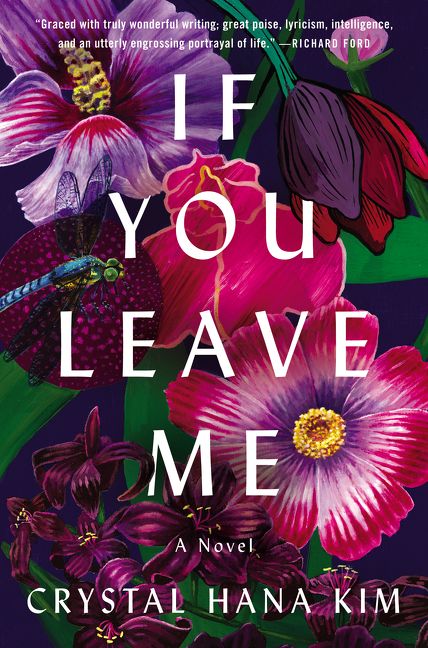As a child growing up on Long Island, author Crystal Hana Kim heard stories about the Korean War from her maternal grandmother, who was a teenage refugee when fighting broke out. These tales both fascinated and devastated Kim, who eventually used them as inspiration for her debut novel, If You Leave Me. “I wanted to write [this book] in order to try and understand that experience,” she says.
In the process of fictionalizing her grandmother’s ordeals, Kim’s broader grasp of the three-year war intensified. “It became very clear to me how relentless this history has been for Koreans,” she says. “That made me want to write about it even more because I haven’t read much fiction about this period of time written in English.”
On Tuesday, Feb. 19, Kim will read from and discuss her work as part of UNC Asheville’s Visiting Writers Series. The event is free and open to the public.
Both a war novel and family saga, If You Leave Me spans 16 years and is told through multiple first-person perspectives. The story begins in 1951, shortly after 16-year-old Haemi Lee has fled south to Busan with her widowed mother and tubercular younger brother in order to escape the bullets and warplanes of the invading northern army. While navigating her new life in a refugee camp, Haemi develops a romantic interest in her childhood friend Kyunghwan. But it’s Kyunghwan’s older and wealthier cousin, Jisoo, who is determined to marry Haemi before enlisting in the army.
Lori Horvitz, UNCA’s English Department chair and the series’ organizer, describes Kim’s writing as “magical, lyrical and gentle.” The layered novel, she notes, explores historical events as well as larger universal themes like love, trauma, sacrifice and tradition. “I think anytime we can learn about world history through fiction, that’s a great thing,” Horvitz says, “especially when we have this complicated personal story, as well.”
Kim shares Horvitz’s opinion. Too often, she says, “when we learn about history or learn about war, it’s so abstract that it doesn’t have an emotional effect on us.” Historical novels, on the other hand, allow for a closer look at the overall impact of combat, including events and relationships beyond the battlefield.
For example, early in the novel, Haemi remembers her village’s mass exodus south. The streets are crowded with civilians, soldiers, tanks and roadside graves. “The mood wavered between community and competition whenever shelter or food appeared,” the narrator states. “I remembered the dead. … Their bodies decomposed quickly, and strangers stole the clothes that covered their limbs.”
 This oscillation between unity and discord is a recurring theme and defining trait among the book’s main characters. While escaping the brutality, Haemi disguises herself as a boy, much to her younger brother’s innocent delight. Enraged by his inability to grasp the weight of her decision, Haemi leans down and tells him: “I’m pretending to be a boy so men won’t rape me.” Her words elicit immediate regret. “Don’t listen to your mean old nuna,” Haemi begs her younger brother, pulling him in for an embrace.
This oscillation between unity and discord is a recurring theme and defining trait among the book’s main characters. While escaping the brutality, Haemi disguises herself as a boy, much to her younger brother’s innocent delight. Enraged by his inability to grasp the weight of her decision, Haemi leans down and tells him: “I’m pretending to be a boy so men won’t rape me.” Her words elicit immediate regret. “Don’t listen to your mean old nuna,” Haemi begs her younger brother, pulling him in for an embrace.
As the novel progresses beyond the war years, the weight of individual experiences continues to influence and shape how the characters interact as well as avoid each other. What holds the book’s five narrators together, however, are their various relationships to Haemi, who goes from a rebellious 16-year-old refugee at the novel’s start, to a wife and mother of four daughters by its end.
Kim says Haemi’s transformation played a crucial role in the story, even in the novel’s earliest drafts. “I’ve always really been interested in gender dynamics, gender expectations and cultural expectations for women,” she says. “I wanted to explore what marriage looked like for a woman who had no options. And what motherhood looked like, as well as postpartum depression during this time period.”
Sorrow and regret invariably haunt Haemi. One of the lingering questions that both she and readers grapple with throughout the novel is what might have been had war never broken out.
The true tragedy of the book, however, is not Haemi’s sense of isolation and despair, but the ubiquity of these shared emotional experiences among the novel’s five narrators. Each has a unique story that’s been directly or indirectly impacted by the war, yet none is able to divulge the sense of loss with those who are equally lost.
Midway through the novel, Jisoo, who endures a lifelong injury from his stint in the army, quietly laments the state of his country following the war. In many ways, the change he sees and his response to it encapsulate the collective tragedy of the book. South Korea isn’t merely rebuilding, Jisoo realizes, but is taking on an entirely new identity based on the ever-present American influence. “I felt duped by my own blindness,” he bemoans. “Like a man who doesn’t know he’s soaked until halfway through a creeping storm.”
WHAT: Crystal Hana Kim discusses her debut novel If You Leave Me
WHERE: UNCA’s Laurel Forum, Karpen Hall, 1 University Heights, avl.mx/5ni
WHEN: Tuesday, Feb. 19, at 7 p.m. Free




Before you comment
The comments section is here to provide a platform for civil dialogue on the issues we face together as a local community. Xpress is committed to offering this platform for all voices, but when the tone of the discussion gets nasty or strays off topic, we believe many people choose not to participate. Xpress editors are determined to moderate comments to ensure a constructive interchange is maintained. All comments judged not to be in keeping with the spirit of civil discourse will be removed and repeat violators will be banned. See here for our terms of service. Thank you for being part of this effort to promote respectful discussion.